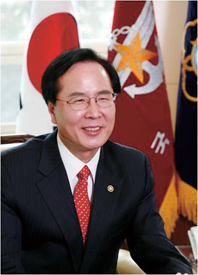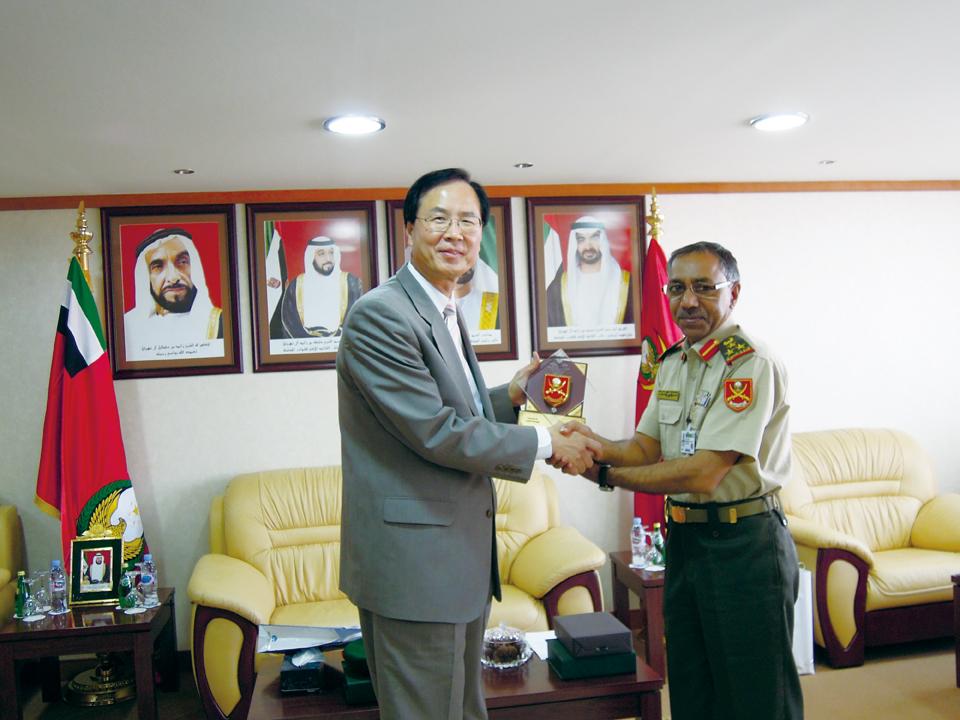DAPA Committed to Ensuring Fair and Transparent Projects
Committee for exporting defense industry products


Noh, Dae-lae, commissioner of the Defense Acquisition Program Administration (DAPA in charge of defense products exports), said his agency strives to execute next-generation defense procurement programs in a fair and transparent manner. The following are excerpts of an interview between NewsWorld and DAPA Commissioner Noh in which he addressed the next Fighter-X project, prospects of defense exports, and the government's support to boost exports.
Question: You have expressed a firm will to carry out the next Fighter-X project in a fair and transparent way. What is your plan toward that end?
Answer: The project involves a huge amount of bidding money and the competition has become fiercer than ever before due to the contracting defense industry markets around the world. There is a concern that the related companies will engage in unfair competition in their bids to maintain the upper hand over their competitors.
The bidding becomes nullified once they break the fair competition rule regardless of whether the responsibility lies in either the government or the bidding companies. For this reason, the Defense Acquisition Program Administration (DAPA) has been determined to abolish such competition-limiting conditions while paying heed to whether the bidding companies are engaged in unfair competition or not.
With the goal of promoting fair competition, DAPA has already been conducting public briefing sessions and posting a request for proposals and will continue to open its decision making process in a very transparent manner. As it has already proclaimed the policy of fair competition, it is impossible to go back to the unfair methods or private contracts. This is because all the related companies are keeping close watch as to whether or not our project is fairly dealt with, and we will not be able to avoid lawsuits if there is unfair management. We have formed a taskforce and pan-governmental body composed of civil officials from 10 relevant government authorities, international lawyers, engineers and scholars. We have also set up a homepage to deal with inquiries in order to prevent possible unfair competition.
Q: In light of the dwindling defense industry markets due to the lingering recession hitting the global economy, what is your prospect for the exporting of defense industry products?
A: The demand for the defense industry sector has been contracting due to the spreading financial woes in Europe and the global economic recession. In addition, Japan has recently announced a plan to resume the export of defense goods, having emerged as a new challenger in the world defense markets.
Despite such a difficult situation, we achieved $2.4 billion in defense industry product exports, equivalent to a 10-fold increase from five years ago. What is noteworthy is the fact that the exports mainly comprised those needing state-of-the-art technologies including air force trainer jets and submarines.
We plan to achieve an export target of $3 billion this year. Compared to other products, defense industry exports are vulnerable to political and other variables. The prospect for this year is not so bright given the ongoing economic contraction. However, we expect to realize the target as we have been making utmost efforts to expand the exports from last year.
Q: You have cited the need to explore the markets with potential buying power. Which countries did you have in mind when you said that?
A: We have been exporting weapons to mainly developing countries suffering from a lack of a defense budget and low state credit and poor financing. Many of them also lack natural resources that can compensate for a lack of cash. Trading with such countries with insufficient payment measures is difficult and doubtful.
In the meantime, we have no export financing system exclusively dealing with defense industry products. We have been utilizing the trade guarantee of the Export and Import Bank, but such assistance is not enough to support massive projects for exports of weapons involving huge amounts of money.
There is no need to define the countries with potential purchasing power as those with cash. As the expenditure for national defense can be defined as necessary spending, we put first emphasis on national defense. The countries putting priority on national defense can be regarded as those with potential buying power.
Q: What is the role of the government in expanding the export markets?
A: Though the exporters of defense industry products are the companies, they cannot make smooth progress unless there is support from the government and the military, who are clients of the products. New efforts are needed at the government level to explore new markets due to the dwindling markets around the world. Furthermore, government support is needed at this point when the demand for defense industry products is decreasing and recovery from lost markets is excessively difficult.
The government needs to strengthen its bridging role with its counterparts in other countries through summit meetings or ministerial-level meetings. The government also needs to find a solution for the possible problems that the counterpart countries face including payment capabilities, training of pilots and repair and maintenance of related facilities.
The government also needs to present customized strategies to expand exports in each country to help the enterprises. For instance, it may need to provide consultation in case the importing nation needs to upgrade its defense system. It may also need to offer a consortium for the countries wanting to see local production. For those eager to import at reasonable prices, we need to have the capability to cut the price in line with customers' requirements.
Q: You visited Turkey in February to discuss ways of solidifying defense industry cooperation. What have you talked about with them?
A: Korea and Turkey agreed during a summit on the need to expand mutual cooperation in the defense industry. At the meeting, Turkey appreciated Korea for its provision of assistance toward the development of Altai tanks. We also agreed to press ahead with working-level negotiations in the areas of the KF-X (Korea Fighter Experimental) and the LAH (Light-sized Armed Helicopter) projects, which Turkey desires to participate in.
DAPA has reviewed the possible joint development of KFX and LAH by dispatching two teams as part of efforts to follow up with the details of the summit talks. Turkey is a nation that shed blood for Korea during the Korean War, dispatching some 15,000 troops. The two nations will likely cement their bilateral ties in the defense industry once they manage to succeed in the project for joint development of the fighter jets and copters.
Q: DAPA has recently introduced the defense quality (DQ) mark for the expansion of exports. What does that mean?
A: We first presented the DQ certificate for 12 products of four companies in February in a test operation of the new program. The DQ mark certificate is meant to guarantee the quality of products to help small and medium-sized companies suffering from lack of marketing abilities despite prospering exports.
DAPA plans to expand the scope of the DQ system to mid-tier companies and conduct strict follow-up measures to develop to those like the UL mark in the United States and the CE mark of Europe. nw
Noh, Dae-lae, commissioner of the Defense Acquisition Program Administration (DAPA in charge of defense products exports)
Noh, Dae-lae, commissioner of the Defense Acquisition Program Administration (DAPA in charge of defense products exports), shakes hands with UAE land forces deputy commander Lt. Gen. Mohammed Al Jabri at the 2011 Dubai Airs Show last November.
3Fl, 292-47, Shindang 6-dong, Chung-gu, Seoul, Korea 100-456
Tel : 82-2-2235-6114 / Fax : 82-2-2235-0799